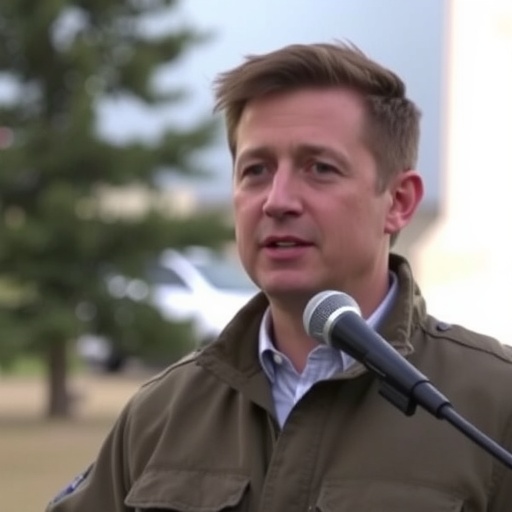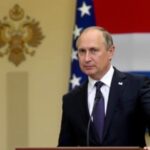Shattering Night in Kyiv: Russian Missiles Target Capital, Sparking Zelensky‘s Fierce Plea
In the dead of night, the skies over Kyiv erupted in chaos as Russian forces unleashed a barrage of missiles, injuring 14 people—including three children—in what Ukrainian officials described as one of the most brazen attacks on the capital yet. The assault, which occurred early Friday morning, targeted residential areas and critical infrastructure, leaving a trail of destruction and amplifying calls from President Volodymyr Zelensky for urgent international support. This latest Kyiv attack underscores the relentless pressure Ukraine faces from Russia, with Zelensky immediately taking to social media and official channels to demand more US Patriot air defense systems to shield his nation’s skies.
- Shattering Night in Kyiv: Russian Missiles Target Capital, Sparking Zelensky‘s Fierce Plea
- Zelensky’s Direct Appeal: ‘Patriot Systems Are Our Lifeline Against Russian Terror’
- Ukraine’s Bold Bid: Seeking 25 Patriot Systems to Fortify Skies Nationwide
- Global Echoes: Allies Rally as Russia Faces Backlash Over Kyiv Assault
- Human Toll and Strategic Shifts: How the Kyiv Attack Reshapes Ukraine’s Defense Strategy
- Looking Ahead: Pathways to Bolster Ukraine’s Skies and Thwart Russian Advances
The incident unfolded around 2 a.m. local time, when air raid sirens pierced the quiet of Kyiv’s neighborhoods. Ukrainian air defenses intercepted several incoming projectiles, but not before explosions rocked the Podil district, a historic area known for its cultural landmarks. Emergency services reported shattered windows, collapsed building facades, and fires that took hours to contain. Among the injured were a family of five, including young siblings aged 7 and 9, who were rushed to the hospital with shrapnel wounds. “This is not just an attack on buildings; it’s an assault on our children’s future,” Zelensky stated in a video address shortly after the strikes, his voice steady but laced with urgency.
According to Ukraine’s State Emergency Service, the attack involved a mix of ballistic missiles and drones, part of a broader Russian strategy to overwhelm Ukrainian defenses through sheer volume. Over the past week alone, Russia has launched more than 200 such projectiles nationwide, testing the limits of Ukraine’s existing air defense capabilities. The Kyiv attack is the third major incursion into the capital in as many months, each one more aggressive than the last, and it has reignited debates about the adequacy of Western-supplied weaponry in countering Russia’s aerial onslaught.
Zelensky’s Direct Appeal: ‘Patriot Systems Are Our Lifeline Against Russian Terror’
President Zelensky wasted no time in framing the Kyiv attack as a stark reminder of Ukraine’s vulnerability without enhanced defenses. In a series of posts on X (formerly Twitter) and a press briefing from his office in Kyiv, he urged the United States to expedite the delivery of additional Patriot air defense systems. “Every delay costs lives. We need more Patriots now to protect our cities, our people, and our fight for freedom,” Zelensky declared, emphasizing that the current arsenal is stretched thin across the front lines and major urban centers.
The Patriot system, a sophisticated US-made battery capable of intercepting ballistic missiles, cruise missiles, and aircraft at ranges up to 160 kilometers, has proven invaluable since its first deployment in Ukraine in late 2022. Zelensky highlighted a specific instance from the recent attack where a single Patriot unit downed three incoming missiles, potentially saving dozens of lives. However, with only a handful operational in the country, experts warn that coverage is spotty, leaving gaps that Russia exploits. “Patriot air defense isn’t a luxury; it’s survival,” Zelensky added, calling on allies to recognize the human cost of hesitation.
Zelensky’s plea comes amid growing frustration in Kyiv over the pace of military aid. In a phone call with US President Joe Biden earlier this week, the Ukrainian leader reportedly pressed for commitments on new systems, citing intelligence reports of Russia amassing more missile stockpiles. Ukrainian Foreign Minister Dmytro Kuleba echoed this sentiment in an interview with BBC News, stating, “The Kyiv attack shows Russia’s intent to break our spirit. Without more Patriots, we risk losing the high ground in this air war.” This direct appeal from Zelensky has already garnered support from European leaders, who are pushing for a unified NATO response.
Ukraine’s Bold Bid: Seeking 25 Patriot Systems to Fortify Skies Nationwide
Underscoring the scale of the crisis, Ukraine has formally requested the purchase of 25 additional Patriot air defense systems from the United States, a move that would represent one of the largest single acquisitions in the ongoing conflict with Russia. This ambitious plan, detailed in a letter from Zelensky to the US Congress last month, aims to create a layered defense network capable of covering not just Kyiv but also frontline cities like Kharkiv, Odesa, and Dnipro. Each Patriot battery, costing upwards of $1 billion including missiles and support, would require significant funding, but Ukrainian officials argue it’s a necessary investment to deter future aggression.
The request builds on previous successes: Since receiving its first Patriots, Ukraine has intercepted over 85% of targeted Russian missiles in defended areas, according to Pentagon estimates. Yet, the Kyiv attack exposed vulnerabilities; preliminary reports indicate that at least five missiles evaded initial detection due to the systems being repositioned to other hotspots. “We can’t afford patchwork protection,” said Andriy Yermak, head of the Presidential Office, in a statement released Friday. “Twenty-five systems would allow us to push back Russia’s air superiority and protect our energy grid from winter blackouts.”
Funding for this expansion is a sticking point. Ukraine has pledged to allocate $5 billion from its defense budget, but the bulk would come from US and EU aid packages. In recent weeks, the US has approved $61 billion in military assistance, part of which could fund Patriots, though bureaucratic hurdles and domestic political debates in Washington have slowed progress. Zelensky’s team is lobbying hard, with diplomats in Brussels and Washington arguing that bolstering Ukraine’s Patriot air defense is key to preventing escalation. One analyst from the Atlantic Council noted, “This isn’t just about Kyiv; it’s about NATO’s eastern flank. A stronger Ukraine means a safer Europe.”
Global Echoes: Allies Rally as Russia Faces Backlash Over Kyiv Assault
The international community has reacted swiftly to the Kyiv attack, with condemnations pouring in from capitals worldwide and renewed pledges for support to Ukraine. UK Prime Minister Rishi Sunak called the strikes “barbaric” during a G7 virtual summit, announcing an additional £200 million in air defense funding that could include Patriot components. Germany, already a major donor of IRIS-T systems, echoed Zelensky’s call, with Chancellor Olaf Scholz stating, “We stand with Ukraine against Russian aggression. More defenses are on the way.”
In the US, bipartisan voices in Congress have amplified the urgency. Senate Foreign Relations Committee Chair Ben Cardin tweeted, “Zelensky is right—Patriots save lives. Let’s get them to Ukraine before the next attack.” Meanwhile, Russia dismissed the incident as a “precision strike on military targets,” a claim Ukrainian officials vehemently deny, pointing to civilian casualties and damage to a nearby school. The UN Security Council scheduled an emergency session Friday, where Ukraine’s ambassador accused Moscow of war crimes, citing the Kyiv attack as evidence of systematic targeting of non-combatants.
Behind the scenes, intelligence sharing has intensified. NATO allies, including Poland and Romania, reported heightened alert levels after detecting Russian aircraft near borders during the assault. This escalation has prompted discussions on expanding no-fly zones or joint patrols, though such measures remain contentious. Humanitarian organizations like the Red Cross are mobilizing aid for the injured, with over 500 families in Kyiv receiving emergency shelter kits in the attack’s aftermath.
Human Toll and Strategic Shifts: How the Kyiv Attack Reshapes Ukraine’s Defense Strategy
Beyond the immediate destruction, the Kyiv attack has inflicted deep emotional and strategic wounds on Ukraine. Witnesses described scenes of terror: families huddled in basements, the acrid smell of smoke lingering into dawn, and first responders sifting through rubble for hours. One resident, Olena Kovalenko, a 42-year-old teacher whose home was damaged, told Reuters, “We thought the Patriots would protect us, but we need more. My son’s school is gone—how do we rebuild under constant threat?” Such personal stories humanize the conflict, fueling public outrage and support for Zelensky’s demands.
Strategically, the incident highlights Russia’s evolving tactics. Analysts from the Institute for the Study of War (ISW) report that Moscow is increasingly using hypersonic missiles, which challenge even advanced systems like the Patriot. Ukraine’s military has adapted by integrating Western tech with domestic innovations, such as drone swarms for early warning, but gaps persist. The push for 25 more Patriots would enable a “defense in depth” approach, layering short-, medium-, and long-range interceptors to create overlapping coverage.
Economically, the attacks strain Ukraine’s infrastructure. The energy sector, already battered by prior strikes, faces renewed risks, with the International Energy Agency warning of potential blackouts this winter without bolstered defenses. Zelensky has linked this to broader security, arguing that protecting power plants is as crucial as defending cities.
Looking Ahead: Pathways to Bolster Ukraine’s Skies and Thwart Russian Advances
As Ukraine navigates this perilous chapter, the path forward hinges on swift international action. Zelensky’s administration is preparing a high-level delegation to Washington next week to negotiate the Patriot deal, potentially including training programs for Ukrainian crews to ensure rapid deployment. Experts predict that if approved, the first systems could arrive by early 2025, offering a critical buffer against Russia’s anticipated winter offensive.
Yet challenges loom: Production backlogs at US defense firms like Raytheon mean scaling up to 25 units will take time, and geopolitical tensions—such as US election uncertainties—could delay aid. On the diplomatic front, Ukraine is exploring alternatives, including co-production deals with allies to diversify sources. The Kyiv attack serves as a clarion call, reminding the world that without enhanced Patriot air defense, Russia’s shadow over Ukraine grows longer.
In the end, Zelensky’s unyielding voice resonates: This fight is for sovereignty, for the innocent lives caught in the crossfire. As negotiations intensify, the global community watches, knowing that bolstering Ukraine’s defenses today could prevent broader instability tomorrow. With 14 injured in the latest Kyiv assault, the stakes have never been higher, and the need for action, more urgent.








